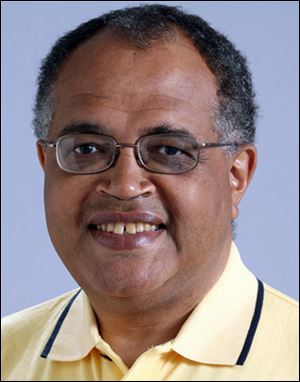
University of Toledo associate law professor observed military court at Guantanamo Bay
2/9/2013
University of Toledo Professor Benjamin Davis.
After spending last week observing the military court at Guantanamo Bay, a University of Toledo associate professor of law said he came home with a new outlook on the judicial process but still convinced it’s a troubled process.
“The way I think about it is, it’s good people in a bad spot,” said Benjamin Davis, who has been critical of the 9/11 Military Commission. “They’re good lawyers doing the best they can in a bad spot.”
Mr. Davis discussed his experiences Thursday at the UT Law Center.
He said he was invited to observe the proceedings during a chance meeting with Brig. Gen. Mark Martins, chief prosecutor in the case against the man considered the mastermind of the Sept. 11, 2001, terrorist attacks, Khalid Sheikh Mohammed, and his four alleged accomplices.
Mr. Davis said he expressed to the prosecutor that while he respected the military, he had no faith in the judicial process at Guantanamo. General Martins told him he thought he needed to see things for himself.
In October, Mr. Davis watched some of the proceedings from Guantanamo at Fort Meade, Md., where they are broadcast at a theater that is open to the public. He made the trip to the military court in Cuba last week with other observers, including reporters and family members of Sept. 11 victims.
“Never far from my mind was the fact that this is a tropical paradise,” said Mr. Davis, whose grandmother was born in Cuba. “... On the other side, you’ve got this tropical hell. You’ve got this detention center with 166 people there now, where there’s been horrendous torture.”
He said the torture issue is not forgotten.
“It’s locked. It’s real. It’s in your face,” he said.
He said that while Mohammed and his four co-defendants most likely will be found guilty, the torture issue certainly will be introduced as part of the mitigation phase for sentencing. In the meantime, the legal conundrums facing the defense lawyers, the prosecution, and the judge are numerous.
Among the questions gnawing at Mr. Davis: In what instances does the U.S. Constitution apply to the military court?
How can defense attorneys provide effective counsel when they don’t have free access to their clients?
How can a military judge with a strong sense of honor and duty challenge the process as a civilian judge would?
Who monitors the proceedings and decides what testimony is classified and subsequently censored to the public?
The proceedings are broadcast with a 40-second delay so that any classified information can be censored for observers at the court and in Fort Meade, Mr. Davis said, but during his first day in court, there was a sudden blackout of the video screen and audio feed to observers.
“You want to see an angry judge in his own courtroom. That became a very big issue,” Mr. Davis said of the interruption in service.
He said he was constantly aware of “the weight of classified protected information. I can’t emphasize to you enough, you could just feel this classification, this sort of hidden stuff. It’s so heavy in the space.”
Mr. Davis said seeing relatives of those killed in the Sept. 11, 2001, attacks threw another wrench into the proceedings.
“They have a lot of frustration with how long all this has taken, and they want justice,” he said.
Contact Jennifer Feehan at: jfeehan@theblade.com or 419-213-2134.